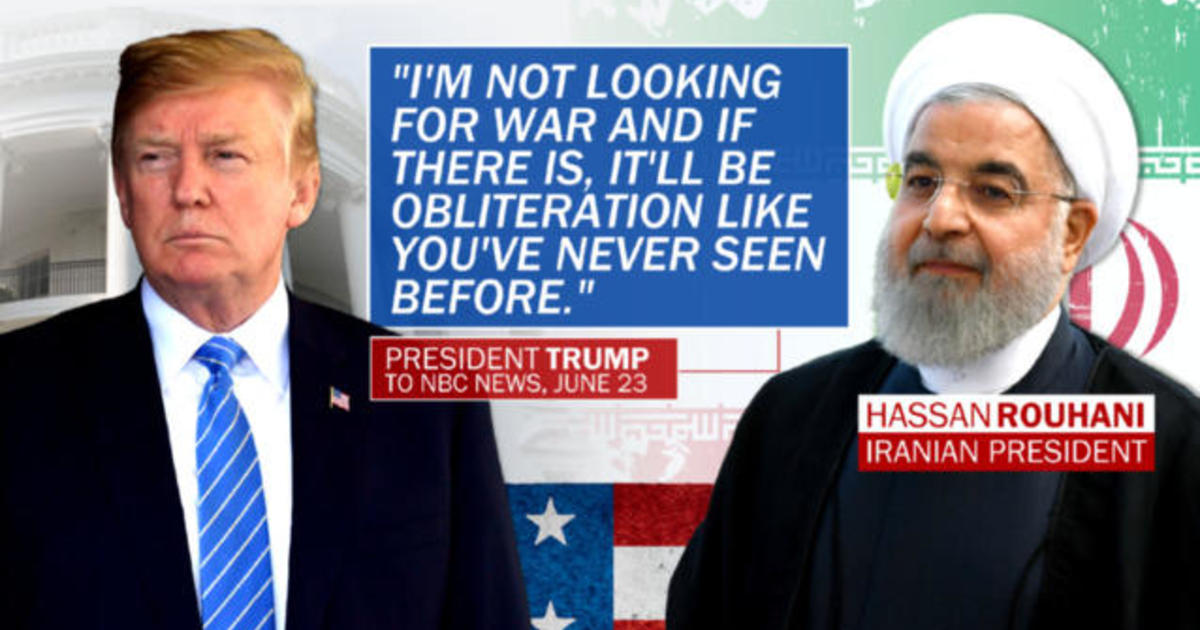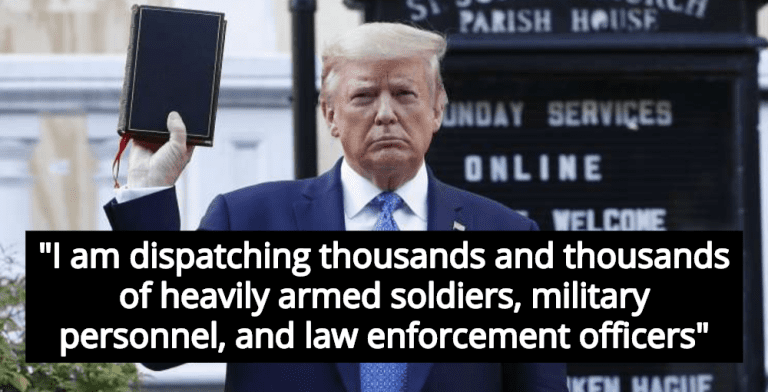
A Very Trumpian Christmas Surprise? Signs Point to a Possible US Attack on Iran
Michael T. Klare / The Nation
(December 10, 2020) — On November 12, President Trump reportedly asked his top national security advisers to prepare plans for attacking nuclear processing facilities in Iran after Tehran announced its intent to accelerate its uranium enrichment activities — a step taken in response to Trump’s withdrawal from the 2015 nuclear deal and his imposition of crushing economic sanctions.
According to White House sources, Trump was talked out of launching an attack on that date by some of his top advisers, including Vice President Mike Pence and Secretary of State Mike Pompeo, who claimed it would ignite an eruption of violence all across the Middle East.
But Trump never pledged to refrain from ordering strikes on Iran at some future time and there is growing evidence that he is preparing to initiate such an assault before his term ends. Indeed, it is entirely conceivable that he will give the go-ahead for an attack now that his legal options for preventing Joe Biden’s inauguration on January 20 appear to be vanishing and he gropes for a way to create pandemonium at home or, at the very least, punish his enemies abroad.
Plans for such a desperate move may have been set in motion as early as November 18, when Secretary Pompeo arrived in Israel for a three-day visit to US allies in the region. While in Jerusalem, Pompeo met with Israeli Prime Minister Benjamin Netanyahu, with Iran a major topic of conversation.
By this point, Israeli plans to assassinate Iran’s top nuclear scientist, Mohsen Fakhrizadeh, on November 27 — nine days later — must have been well developed. Given the bond between the two and their shared hatred of the Iranian leadership, it is reasonable to assume that Netanyahu informed Pompeo of the planned strike and that the two then discussed how their countries would respond to any Iranian retaliation.
In the days that followed, senior officers of the Israeli Defense Forces (IDF) began communicating with their counterparts at the US Central Command (Centcom) headquarters in Bahrain about coordinating their responses to likely Iranian retaliatory moves.
Meanwhile, [Pompeo] continued on to Qatar, Saudi Arabia, and the United Arab Emirates to discuss greater regional collaboration in combating Iran’s “malign influence” in the region; whether this included discussion of specific plans for attacks on that country cannot be known with any certainty, but surely the general notion of a conflict with Iran was on the agenda.
In the days following Pompeo’s visit to Israel and Gulf kingdoms, a series of subsequent events suggest further planning for US (or US/Israeli) military action against Iran:
- On November 21, two US Air Force B-52 heavy bombers from the 5th Bomb Wing, based at Minot Air Force base, N.D., flew on a round-trip flight to the Persian Gulf in what was described as a test of America’s ability to project additional firepower into the region on very short notice.
- On November 25, Acting Secretary of Defense Chris Miller made an unannounced visit to US forces in Bahrain, his first trip overseas after being appointed to that position on November 9, after Trump fired Mark T. Esper (who was deemed insufficiently loyal to the president). Although Miller’s Thanksgiving visit was said to be a morale-boosting event for US troops stationed abroad, he also met with senior officers at Centcom, whose forces would play a key role in any military action taken against Iran.
- On November 27, just hours after the assassination of Mohsen Fakhrizadeh, the aircraft carrier Nimitz, along with its 70 or so combat aircraft and accompanying cruisers and destroyers, sailed into the Persian Gulf. Although the move was said to be related to US troop withdrawals from the region, it was seen by some as unusual, as the Nimitz had been at sea for several months and was scheduled to return to its homeport in Bremerton, Wash.
- At about this time, the IDF went into their highest state of readiness in anticipation of revenge strikes by Iran in retaliation for Fakhrizadeh’s assassination.
- On December 2, the State Department began reducing staff at the US Embassy in Baghdad, supposedly in anticipation of possible attacks on the embassy by Iraqi-based militias loyal to Tehran.
It is possible, of course, to overstate the significance of one or more of these events or to misread their intent. Nevertheless, they suggest a pattern of coordinated steps that would allow President Trump to order multiple strikes on military and nuclear facilities in Iran at any point, whether following some act of retribution for Fakhrizadeh’s assassination or a new report of accelerated Iranian uranium enrichment — or at his own whim.

A US attack on Iran could take several forms, but the most likely would involve air and missile strikes on the Iranian centrifuge facility at Natanz — the epicenter of Iranian enrichment activities — and on other nuclear-related laboratories and processing facilities. Other targets would in all likelihood include Iranian anti-air-attack radars and missile batteries, key air and naval bases, and the headquarters of the Islamic Revolutionary Guard Corps.
Given the generally poor condition of Iranian defenses — because of the sanctions, Tehran has not been able to purchase new weapons or obtain spare parts for its old ones — a US assault of this sort, limited to air and missile strikes, should result in few if any American casualties. But any such attack would surely spark significant Iranian retaliation of some sort, and Tehran possesses a variety of means for punishing the United States and its allies.
These include, for example, attacks on US and allied forces by pro-Iranian militias scattered throughout the region, such as Hezbollah in Lebanon and Shiite militias in Iraq. Other Iranian retaliatory options include disrupting the global economy through attacks on oil tankers and oil-processing facilities in the Gulf and along its shores. Such moves, in turn, would spur additional US military action, along with countermoves by the IDF and the Gulf kingdoms.
Although the United States is certain to prevail in any such contest, the outcome may not prove as satisfying as Trump and his most ardent supporters, both here and in Israel, may assume. Yes, Tehran’s efforts to produce a nuclear weapon (even assuming that is its objective) would be set back a few years, but the Iranians will almost certainly rebuild their enrichment facilities, no doubt in underground facilities less vulnerable to air attack. More importantly, the chaos unleashed by such a move could result in widespread harm to American soldiers still serving in the region and to the civilian populations of friendly countries; of course, many civilians in Iran would suffer as well.
In Iran itself, hatred of the United States would reach a new peak of frenzy and the country’s hard-line clerical leadership would surely strengthen its grip on power. Presidential elections are scheduled there for June 2021, and Iran’s constitutional watchdog, the Guardian Council, is bound to limit the candidate list to hard-liners who eschew any intention of negotiating with the United States.
Under these circumstances, it will prove almost impossible for a Biden administration to restore the 2015 nuclear deal (officially, the Joint Comprehensive Plan of Action), as the president-elect has said he wishes to do.

We might also ponder the domestic consequences of an attack on Iran at this turbulent final stage of Trump’s presidency. Certainly the destruction of Iran’s nuclear facilities would solicit widespread applause in Washington, if all goes well and the United States suffers few if any casualties. This could embolden Trump to take a variety of disruptive measures, such as a further purge of the federal bureaucracy and a further flurry of last-minute efforts to negate the results of the 2020 presidential election. If things turn out badly, however — as well they might — Trump could take even more extreme measures, such as trying to declare martial law and void the election.
All this should tell us: Don’t wait until the bombs start dropping to protest a US military strike on Iran, protest now. Public protest activity may have to be curtailed in this time of Covid, but there is much else that can be done — especially in Congress and via the media. Peace and anti-war groups like CODEPINK, Peace Action, and Win Without War should alert their members about these risks and urge them to take immediate action.
Most importantly, members of Congress should be urged to speak out against a possible military strike on Iran, demand answers from top Pentagon officials about planning for such a move, and adopt resolutions prohibiting presidential action without congressional consultation and approval.
Call or write your representatives to Congress, insisting that they take these steps. Readers with ties to the media should ask editors to address similar questions to the Pentagon leadership and to write editorials condemning precipitous military action against Iran.
Once the bombs start falling, it may prove impossible to prevent another deadly US entanglement in the Middle East — the time to prevent that is now.
Michael T. Klare, The Nation’s defense correspondent, is professor emeritus of peace and world-security studies at Hampshire College and senior visiting fellow at the Arms Control Association in Washington, DC. Most recently, he is the author of All Hell Breaking Loose: The Pentagon’s Perspective on Climate Change.

Could Trump Become America’s Franco?
Gar Smith / The Berkeley Daily Planet
(November 28, 2020) — On Thanksgiving Day, Reader Supported News sent out a line-up of stories that buoyed my spirits one moment and dashed my hopes the next. A jolting emotional experience — elation followed by deflation.
The first headline (for a Guardian article) read: “Here’s Something to Give Thanks for this Thanksgiving: Our Democracy Survived.”
That was followed by a ProPublica piece headlined: “Trump Races to Bring Back Firing Squads, Electrocutions, Exclude Transgender People from Shelters.”
We need to face an alarming reality: Trump may be leaving the White House but he’s not going to disappear. If he’s not tied up in court over his tax scams, hush-money, and bribes — or shackled and tucked away in a jail cell — he’s going to be bounding around the country stirring up trouble.
Trump is already engaged in an anti-Democrat media-war-cum-cultural-vendetta that feeds on division and lies. He will target the Biden-Harris administration for destruction on a daily basis, using every wrench, hammer, and crowbar in his toolbox.
As Jesse Jackson recently warned, Trump’s inability to accept his election loss will be answered with “brazen subversion . . . . a clown show marked by wingbat lawyers, delusional tweets, and hailstorms of lies. . . . a counter-reformation right to the edge of succession, if not beyond.”
As Jackson recalls, the last time a presidential election was contested was in 1860, when Abe Lincoln’s ascension to the Oval Office (1) prompted the South to succeed from the Union and (2) triggered a bloody Civil War.
In it’s current issue, The Economist observes that the world is facing a “global recession in democracy” and the US is not immune: “Mr. Trump has still done harm, as have the Republican leaders who indulged him.” As a result, “Trust in the fairness of elections has been shaken . . . . The threat is not from military coups but presidents and prime ministers as they erode norms and institutions.”
Trump has not vanished nor has he been vanquished. He still has the power to propel a fascist tide that could sweep the country. With stunning suddenness, Trump could become as politically destabilizing to the US as the Taliban is to Afghanistan or as the al-Nusra Front is to Syria.
War with Iran? Declaration of National Emergency? A Trump Coup?
Shocking news from the Middle East: Israel is accused of assassinating Mohsen Fakhrizadeh, an Iranian nuclear scientist. CODEPINK has just posted a petition calling on world leaders — including US President-elect Joe Biden — to “condemn Israel’s illegal execution” as “an act of flagrant disregard for international law.”
CODEPINK writes: “We are worried about an escalation to an all-out US-Iran war” that could derail Biden’s promise to return to the Iran Nuclear Deal. It has been widely reported that Trump has been planning a US attack on Iran and has tried repeatedly to provoke Tehran. Some observers fear Trump might start a war in order to declare a “state of national emergency” that would allow him to remain in power.
According to the 1973 War Powers Resolution, a president can unilaterally declare war in the event of an attack “upon the United States, its territories or possessions, or its armed forces.” (The heavily armed US naval ships that Trump has ordered to patrol the waters off Iran could be seen as tempting targets.)
As Elizabeth Goitein noted in The Atlantic: “The moment the president declares a ‘national emergency’ — a decision that is entirely within his discretion — more than 100 special provisions become available to him.” Those “provisions” include the power to shut down the Internet, freeze citizens’ bank accounts, and declare martial law, sending US troops into American cities to “subdue domestic unrest.”
Goitein’s article (published in January 2019) contained this chilling speculation: “[W]hat if a president, backed into a corner and facing electoral defeat or impeachment, were to declare an emergency for the sake of holding on to power? In that scenario, our laws and institutions might not save us from a presidential power grab. They might be what takes us down.”
How to Handle a Deranged Tenant
It’s not an uncommon event: a tenant, facing eviction, refuses to vacate the premises and, in a parting gesture of defiance, trashes the property, leaving the landlord to deal with the wreckage.You guessed it: I’m thinking about Donald Trump.
TV host Jimmy Kimmel recently coined a term for Trump’s refusal to accept the fact that his first term in office has been electorally terminated. Kimmel’s word for Trump’s Oval Office recalcitrance: “Squattergate.” (Kimmel has also hatched a nickname for Trump: “Uncle Scam.”)
Faced with the spectacle of Trump doing everything he can to make the new tenant’s arrival difficult, unpleasant, and challenging, Kimmel wondered aloud why we provide loosing leaders in contentious elections the ripe opportunity to hang around for two months, mucking up the governing process until Inauguration Day rolls around.
In response, Kimmel has proposed a Constitutional solution. He called it the Airbnb Rule: “Lose an election and the next day you’re out at 11 AM.”
Trumplandia: Martial Law and Public Executions?
In Tenant Trump’s case, he’s not just writing dirty words on the White House walls, he’s threatening to burn down the whole neighborhood — from sea to shining sea.
While Trump may have lost the unquestioned fealty of his Chief Toady — the frog-like Attorney General William Barr, who recently proclaimed the 2020 election legit — Trump can still count on a mob of lesser firebrands who have been turning up the heat with a chorus of horrific harangues.
Trump’s former National Security Advisor Lt. Gen. (Ret.) Mike Flynn is promoting a petition calling on Trump to declare “martial law” and order a new election supervised by the Pentagon and local police.
The petition implausibly calls for defending democracy from “the international and domestic socialist/communist left” by “temporarily suspend[ing] the Constitution.” The petition warns that, without armed troops standing guard to oversee new elections, “the threat of a shooting Civil War is imminent.”
Meanwhile, disgraced Trump attorney Sydney Powell is tweet-begging Trump to invoke the Insurrection Act, declare the election void, and set up “military tribunals” to deal with anyone who dares say otherwise. Some StormTrumpers are even calling for “public executions” of their fellow Americans.
Posted in accordance with Title 17, Section 107, US Code, for noncommercial, educational purposes.